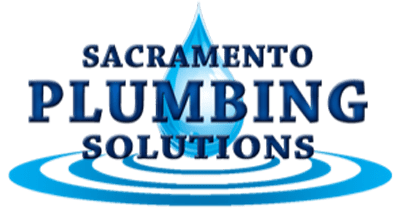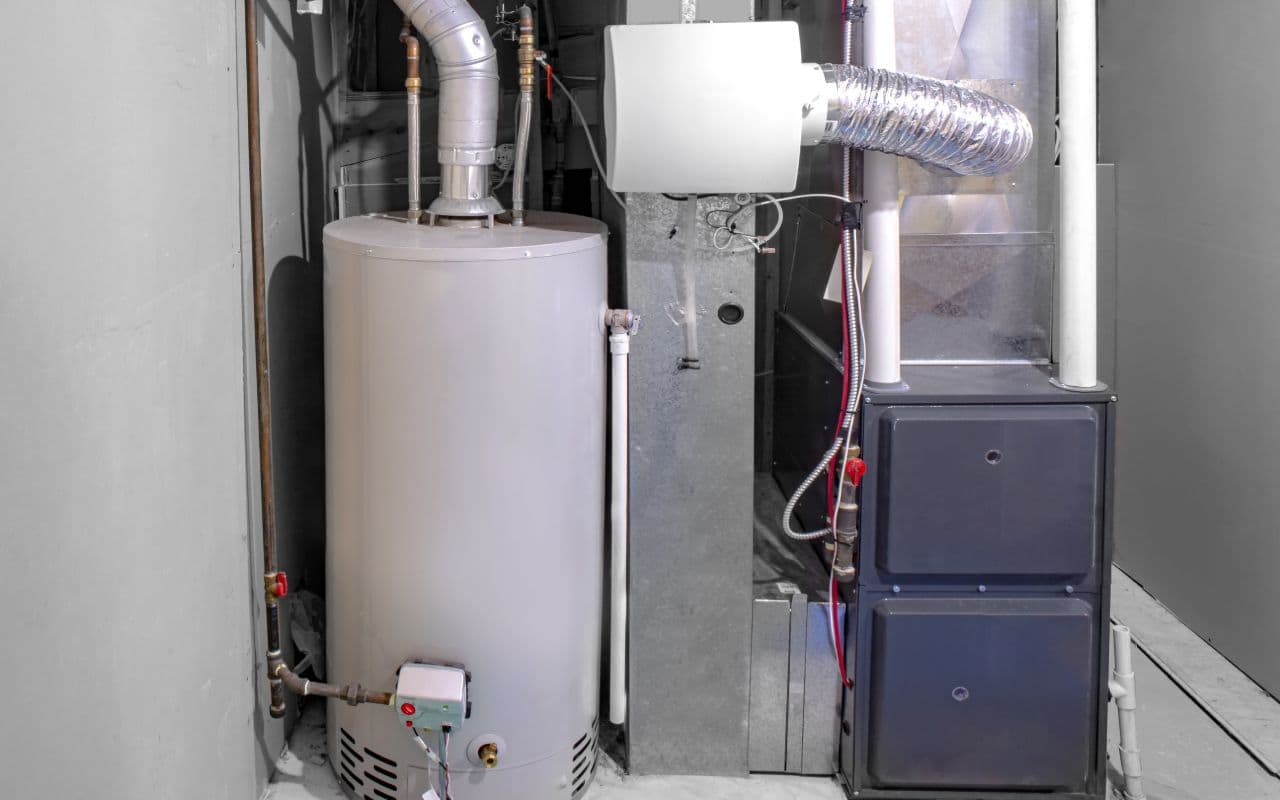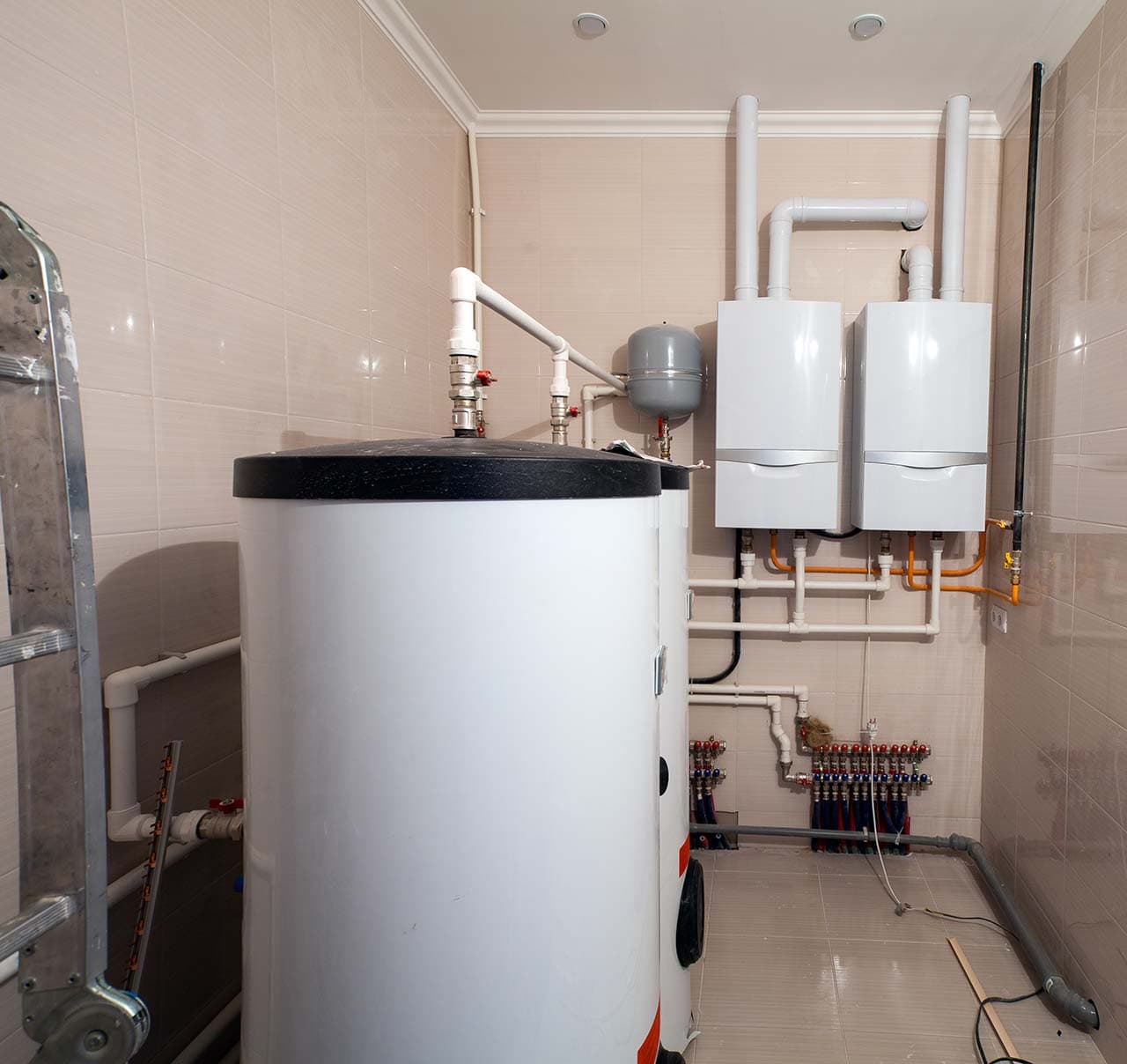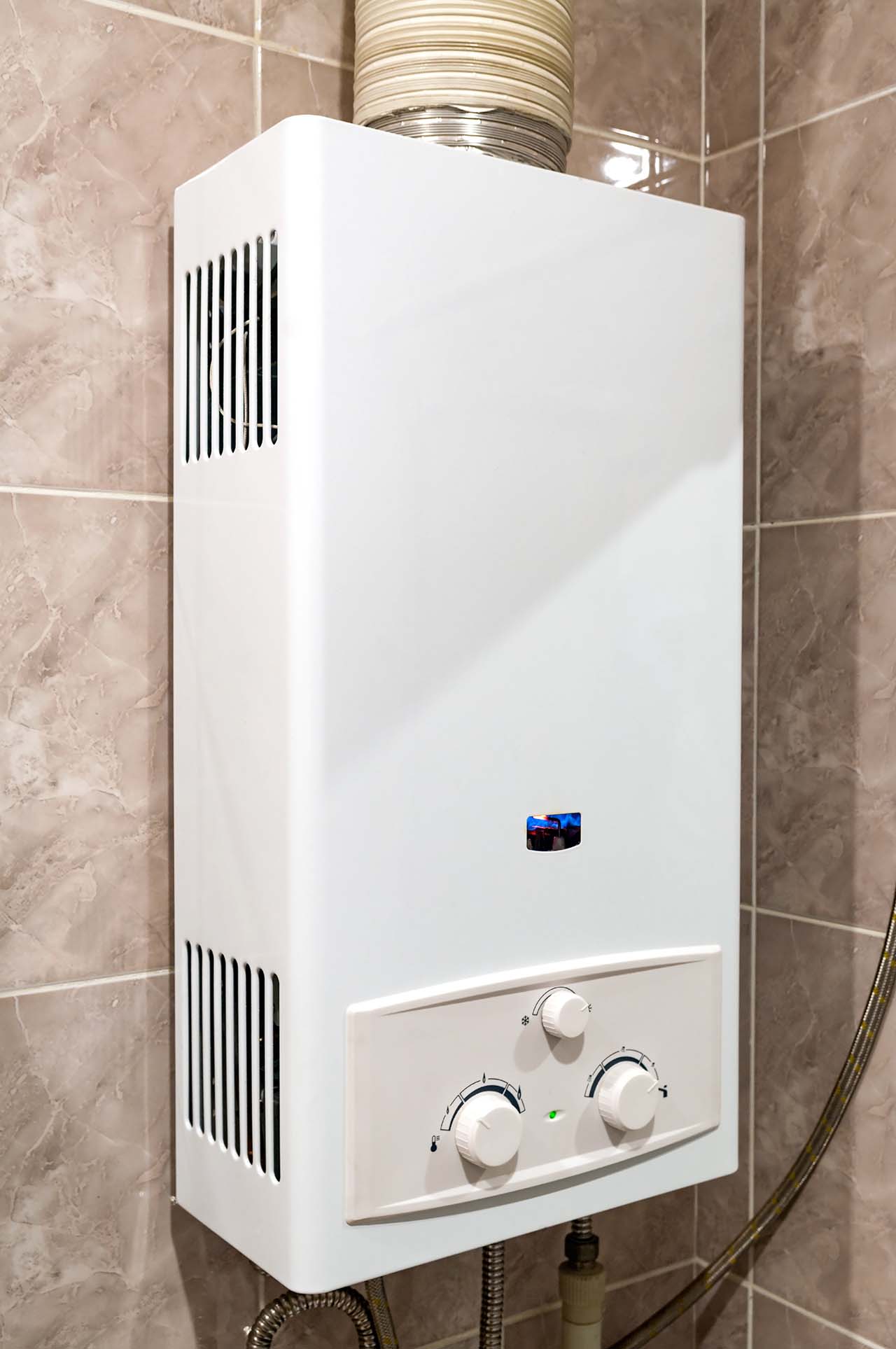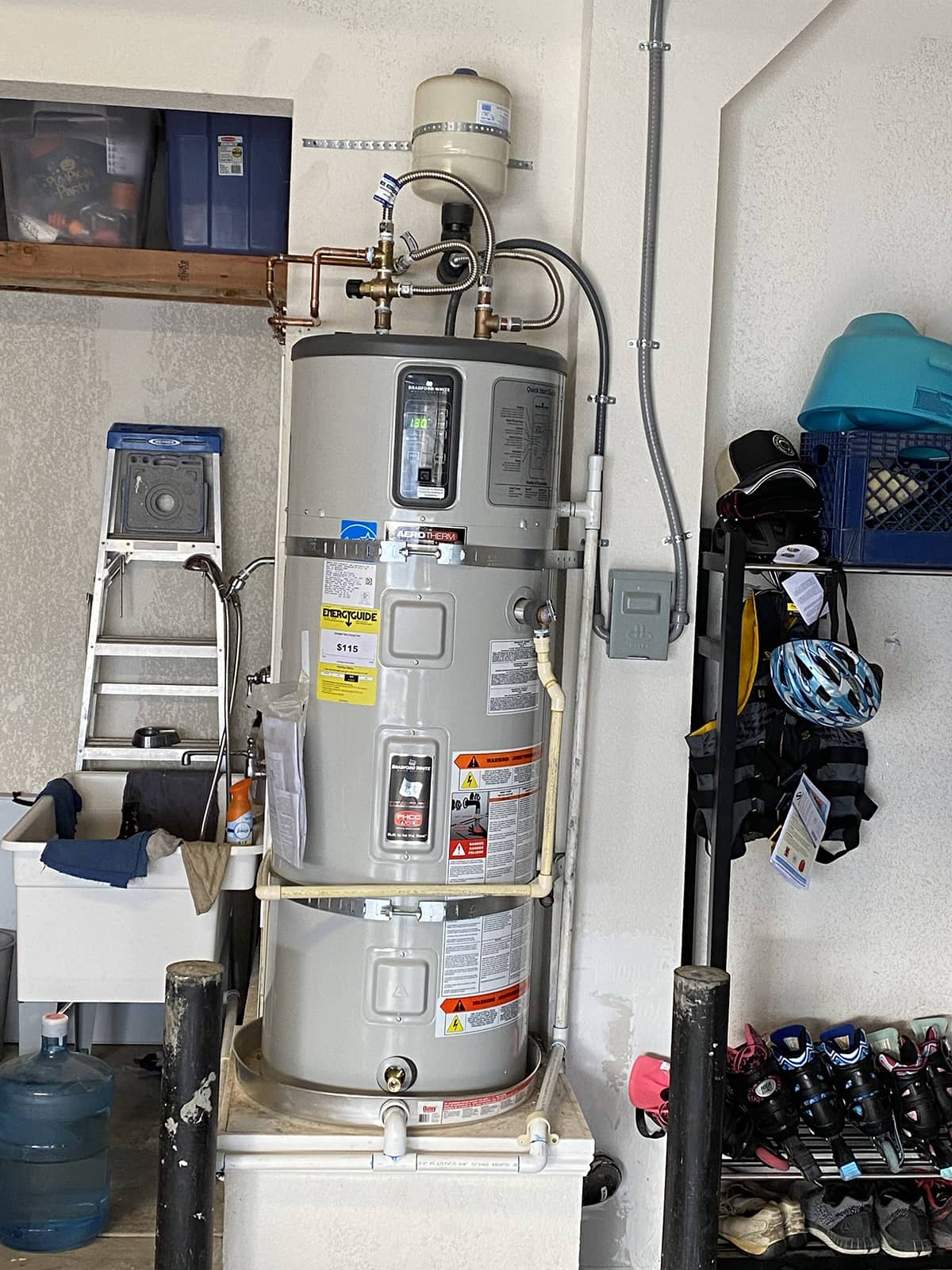Home »
Heat Pump Water Heaters
Homeowners looking for a water heating solution that maximizes a home’s energy efficiency while lowering energy costs will love the heat pump water heaters we provide.
At Sacramento Plumbing Solutions, our award-winning service, competitive rates, and satisfaction guarantees have earned us the privilege of being the preferred heat pump specialists in the Greater Sacramento area.
If you live in Roseville, Elk Ridge, Citrus Heights, or any other part of Northern California, schedule a free plumbing estimate today to determine the perfect heat pump solution for your home.

Free Estimate
Heat Pump Water Heaters Explained
If you’re not sure where to start, find out what size water heater you need first. Heat pump water heaters use mechanics similar to refrigerators but in reverse. While refrigerators use a compressor to extract ambient heat from inside the box to lower the internal temperature, heat pump water heaters use a similar compressor to transfer heat from the surrounding environment to warm the water within a storage tank. If the surrounding environment becomes too cold, most systems include a backup heating element that will act similar to a hot water tank.
Multiple types of heat pump water heaters extract heat from different sources. Some of the most popular styles include:
Air-Source Heat Pump Systems
Air-source heat pumps extract heat from ambient air surrounding the water heater to heat the water within the storage tank. Homeowners can purchase air-source heat pump systems as integrated units, including the pump and storage tank as one complete system. Alternatively, an experienced professional plumber can convert your existing gas hot water tank by retrofitting it with an electric air-source heat pump water heater.
Geothermal Heat Pump Systems
Geothermal heat pumps, also called GeoExchange, earth-coupled, ground-source, or water-source heat pumps, transfer heat from the relatively constant temperature of the ground, a few feet beneath the Earth’s surface, to heat the water within the storage tank. Compared to air-source heat pumps, geothermal heat pumps are quieter, last longer, require less maintenance, and rely on a more constant heat source.
Dual-Source Heat Pump Systems
Dual-source heat pumps utilize both air-source and geothermal heat to combine the best of both systems. The main advantage of these systems is they are more efficient than strict air-source systems while being significantly cheaper and only slightly less efficient than strict geothermal systems.
The Benefits of Heat Pump Water Heaters
While installing a heat pump water heater requires a more significant initial investment than other types of water heaters, there are several benefits to using this system in your home. While there are many advantages, here are some of the significant benefits of heat pump water heaters:
Ultimate Energy Efficiency
Heat pump water heaters are the answer for homeowners interested in maximizing their home’s efficiency and minimizing their carbon footprint. These systems are the pinnacle of energy efficiency in the water heater industry. They are 7x more efficient than gas hot water tanks, 3.5x more efficient than electric hot water tanks, and up to twice as efficient as tankless water heaters. Simply put, heat pump water heaters have no competition regarding energy efficiency.
Impressive ROI, Savings, and Rebates
Along with the moral benefits of choosing such an efficient heating system, homeowners enjoy equal financial advantages. Despite the initial installation and maintenance costs, statistics show a 30 amp heat pump water heater conversion in California will pay for itself after about two years. From that point on, homeowners will enjoy between $174-$435 of annual savings depending on family size. In addition to a rapid ROI and impressive yearly savings, the California Public Utilities Commission (CPUC) recently announced a new incentive program to reward single-family homeowners who convert to a heat pump water heater with rebates between $3,800-$4,885 based on the family income.
All-In-One Heating and Cooling Systems
In addition to being an excellent standalone water heating solution, homeowners can utilize heat pumps as a complete home heating and cooling system. During cold seasons, heat pump systems pull heat into the home to warm ambient and water temperatures. Then, during warm seasons, they cool the home’s ambient temperature by extracting hot air from within the home while maintaining hot water temperatures. The result is a highly energy-efficient home with hot water, comfortable ambient temperatures, and significant energy savings.
Types of Water Heaters
|
Water Heater Type |
Storage | Tankless | Heat Pump |
| How They Work |
A storage water heater holds a reservoir of hot water and operates by releasing hot water from the top of the tank when you turn on the hot water tap. Cold water fills the bottom of the tank after use. | Tankless water heaters are energy-efficient water heating appliances that warm water instantaneously without the need for a large storage tank. As cold water flows through the unit, the built-in heat exchanger warms the water using either an electric or natural gas burner resulting in an endless supply of hot water without concern for an empty storage tank. | Heat pump water heaters use a compressor to transfer heat from the surrounding environment to warm the water within a storage tank. If the surrounding environment becomes too cold, most systems include a backup heating element that will act similar to a hot water tank. |
| Pros |
- Lower purchase cost. - Allows for simultaneous, multiples uses of hot water. |
- Superior energy efficiency, 8%-34% more efficient than storage water heaters with up to $100 annual savings. - On-demand hot water - Impressive 20+ year lifespan. |
- Ultimate energy-efficiency - Impressive ROI, savings, and rebates - All-in-one heating and cooling system integration |
| Cons | - Standby heat loss can occur, wasting energy even when a hot water tap isn't running.- |
- Higher initial cost. - Hot water output limited to about 2-5 gallons per minute; multiple heaters may be needed if hot water demand is high. |
- Can only be installed in locations that remain in the 40–90 degrees Farenheit range year-round. - Require at least 1,000 cubic feet of air space around the water heater. |
Sacramento Heat Pump Water Heater Services
Sacramento Plumbing Solutions is the go-to professional plumbing provider for all your heat pump water heater needs. We’re at your service if you want to install a new integrated or retrofit heat pump system.
Our skilled contractors will complete your installation in three to five hours, depending on the application. Likewise, we’re pleased to provide any maintenance or repair services required throughout the lifetime of your water heater. Call Sacramento Plumbing Solutions today, and we’ll be over as soon as possible (often, the next business day) to resolve any heat pump water heater needs.
Heat Pump Water Heater FAQs
Will heat pump water heaters work in a cold room?
Heat pump water heaters work best in warmer climates or rooms with excess heat, such as a furnace room. They can still work in cold climates, just not as efficiently. To function efficiently, heat pump water heaters must be installed in a location with an ambient temperature that remains between 40℉ and 90℉ year-round.
I have a gas hot water tank. How difficult is it to switch to a heat pump water heater?
We convert old gas water heaters to new electric heat pump water heaters daily while removing and recycling your old tank. Additionally, we refit pipes, tie them into a 30 amp circuit, and add new ten gauge wiring.
What Size Heat Pump Do I Need?
The two most significant factors for deciding what pump size is right for your application include the size of your house and the available space for installation.
Standard tank sizes include:
-
50gal.
-
66gal.
-
80gal.
Bigger may be better, but always remember to leave room to access and service your pump’s air filter.
